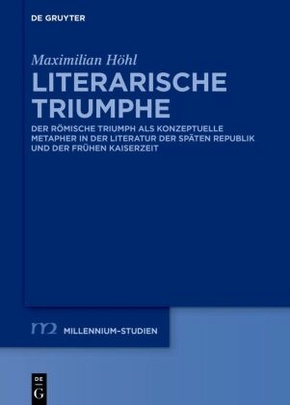
Literarische Triumphe - Der römische Triumph als konzeptuelle Metapher in der Literatur der späten Republik und der frühen Kaiserzeit
| Verlag | De Gruyter |
| Auflage | 2023 |
| Seiten | 330 |
| Format | 22,0 x 2,2 x 22,9 cm |
| Gewicht | 695 g |
| Reihe | Millennium-Studien / Millennium Studies 103 |
| ISBN-10 | 3111080897 |
| ISBN-13 | 9783111080895 |
| Bestell-Nr | 11108089A |
Der Triumphzug bestimmte das Denken und Handeln der Römer in hohem Maße. Dies gilt nicht nur für die Zeit der späten Republik, in der die Triumphzüge hart umkämpft waren, sondern auch für die frühe Kaiserzeit, in der das Ritual immer mehr aus dem Alltag verschwand.
Der vorliegende Band untersucht neben Texten, die auf den römischen Triumph rekurrieren, vor allem solche, die den Triumph als Modell performativ oder metaphorisch in sich eingeschrieben haben: Während Caesar seinen eigenen Feldzug in De bello Gallico literarisch verewigt, präsentiert Plinius der Ältere seine Naturalis Historia als einen Triumph der Wissenschaft. Cicero und Vitruv übertragen das Konzept in die geistigen Bereiche der Rhetorik und Architektur und die frühkaiserzeitliche Laus Pisonis lässt das Leben eines kaiserzeitlichen Aristokraten als einen einzigen Triumphzug erscheinen. Der Begriff der konzeptuellen Metapher ermöglicht es, den Triumph als ein intertextuelles und intermediales Modell zu verstehen und seine Aktualisierung in verschiedenen Kontexten zu untersuchen.
Durch die Systematisierung der heterogenen Texte unter Berücksichtigung kulturwissenschaftlicher Konzepte liefert dieser Band einen wichtigen Beitrag zur Erforschung antiker Ästhetik und kultureller Identität.
The triumphal procession determined the thoughts and actions of the Romans to a great extent. This applies not only to the period of the late Republic, in which triumphal processions were fiercely contested, but also to the early imperial period, in which the ritual increasingly disappeared from everyday life.
In addition to texts that refer back to the Roman triumph, this volume examines above all those that inscribe the triumph as a model performatively or metaphorically: While Caesar immortalises his own campaign in De bello Gallico, Pliny the Elder presents his Naturalis Historia as a triumph of science. Cicero and Vitruvius transfer the concept to the intellectual realms of rhetoric and architecture, and the early imperial Laus Pisonis makes the life of an imperial aristocrat appear as a single triumphal procession. The notion of conceptual metaphor makes it possible to understand the triumph as an intertextual and intermedial model and to examine its actualisa tion in different contexts.
By systematising the heterogeneous texts, taking cultural studies concepts into account, this volume makes an important contribution to the study of ancient aesthetics and cultural identity.
